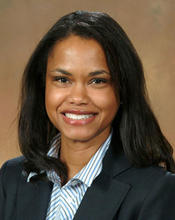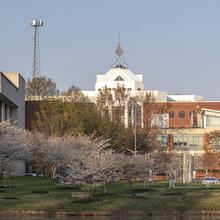The Costello College of Business at George Mason University is an acknowledged center for global business research.
Faculty take a multidisciplinary approach, with the goal of ensuring that business can be a force for the greater good.
Faculty publish in leading business journals on wide-ranging global business issues, are cited by the press, and are actively engaged in making discoveries to address a wide set of societal and institutional challenges.
Impactful Scholarship
Three pillars define the real-world impact of Costello College of Business thought leadership:
Ensuring Global Futures
Safeguarding our planet and societies from the crises identified in the United Nations Sustainable Development Goals (SDGs). Recent highlights include:
- Are Electric Cars Really Green? mic.com
- CPG Can No Longer Afford to Harm the Planet AdWeek.com
- Supporting the Honey Bee to Make the World a Better Place School of Business News
- Embedding the SDGs into Business Education The PRME Blog
Digital Transformation of Work
Preparing global organizations and professionals for the massive technological changes that are reshaping business.
- Facilitating a Paradigm Shift: An Acquisition Playbook for the Information Age School of Business News
- As Offices Reopen, Hybrid Onsite and Remote Work Becomes Routine SHRM.org
- How to Manage Performance Evaluations in the Work-From-Home Era New York Times
- Employees Are Working An Extra Day In Unpaid Overtime Each Week Forbes.com
Entrepreneurship and Innovation
Fostering the creative problem-solving skills needed for success in an increasingly unpredictable world.
- Using Geospatial Technology to Promote Economic Development of Africa School of Business News
- Prince Harry isn't the first famous name in tech, but his role at S.F. startup is rare San Francisco Chronicle
- For $40/Month, Equinox's Variis App Is Now Accessible to All Well+Good
Costello College of Business Faculty Research
- March 9, 2023The moment a brand publicizes its good works, it’s at risk of seeming cynical. A Mason professor offers research-based advice on how to generate lasting brand value from sustainability.
- March 8, 2023An explosion of digital technology made today’s hybrid workplace possible, but it couldn’t upgrade the analog infrastructure that is the human brain.
- February 28, 2023Negotiation is a critical skillset in business and in society. Negotiation is a complicated, joint decision problem where parties can, potentially, make each other better off—but also have some competing interests. Einav Hart, assistant professor of management at George Mason University, suggests that our relationships and context influence how we should negotiate—and even whether it is a good idea to negotiate at all.
- February 22, 2023Human trafficking is a global crisis of overwhelming scope. Fortunately, anti-trafficking organizations can use AI to predict the criminals’ next moves–with the help of a George Mason University professor.
- February 2, 2023Thanks to TikTok, Twitter, Instagram et al, we are living in the age of social influence. But how can influence be harnessed to make the world a better place? Yun Young Hur, assistant professor of information systems at George Mason University School of Business, explores that question in a recently published paper in Information Systems Research.
- January 31, 2023Research by Mason Accounting Professor Bret Johnson, a former SEC staff accountant and academic fellow, shows how seemingly mundane intra-agency policies can have unintended effects that benefit Wall Street over Main Street.
- December 13, 2022Managers often struggle to motivate their teams, but that could be because they’re looking in the wrong place. Mason School of Business professor Shora Moteabbed believes that how employees relate to one another on a one-to-one basis is key to understanding—and influencing—workplace behavior.
- December 8, 2022Marketing professor Tarun Kushwaha’s recent research finds that the effectiveness of brands’ growth strategies can be correlated with the state of the economy. Analyzing 17 years of data on U.K. brands, Kushwaha concludes that brands that prioritize assortment and wider distribution are in the best position to weather the ups and downs of the macroeconomic cycle.
- December 7, 2022Management professor Toyah Miller recently co-edited a special issue of Global Strategy Journal exploring how changes in our world are shifting the opportunity space for start-up founders and funders. Miller is the new research director of the Center for Innovation and Entrepreneurship at the School of Business and an expert in the rapidly expanding field of social entrepreneurship.
- December 1, 2022George Mason University’s Business for a Better World Center (B4BW) recently convened an in-person Stakeholder Roundtable on the subject of Corporate Governance. The half-day event took place at Point of View International Retreat & Research Center at Mason Neck in Lorton, VA on October 21.
- November 29, 2022Mehmet Altug, an associate professor of operations management, has been researching retail returns policies for a decade. The issue has recently come to prominence, as the lenient policies of online retailers have led to skyrocketing return rates (now exceeding 20 percent in the U.S.). Altug’s various academic papers delve into the difficult trade-offs retailers face when setting returns policies. While there are no easy answers, Altug’s research identifies factors that can help retailers achieve more strategic flexibility.
- November 10, 2022On the morning of Wednesday, October 26th, George Mason University professor Suzanne C. de Janasz conducted her first-ever negotiations workshop for female high school students at McLean High School in Northern Virginia. An enthusiastic audience of about 100 young women came to hear de Janasz explain why negotiation is important for women of all ages and walks of life, and how to build negotiating skills for the future. De Janasz, an organizational researcher who holds a joint appointment in the School of Business and the Carter School for Peace and Conflict Resolution, says there is a pervasive cultural bias against women who ask for what they deserve. The negative labelling begins in childhood, with terms such as “bossy” being applied to more assertive girls.












